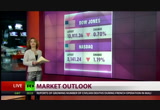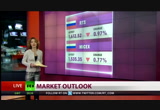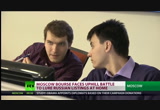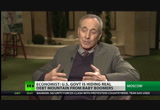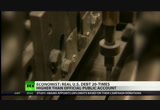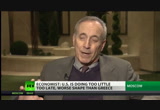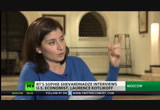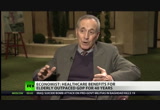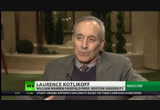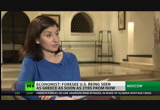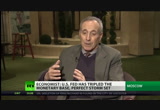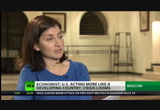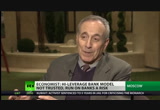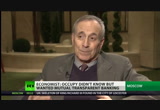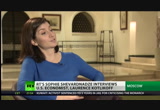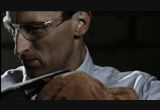tv [untitled] February 4, 2013 3:30pm-4:00pm EST
3:30 pm
she's the only one who can get rid of the roaches people like hillary clinton who support funding brutal jihad as rebel groups to overthrow governments to somehow bring about stability and democracy are either dismally stupid or consciously running a very brutal con game but that's just my opinion. it's thirty minutes past the hour you're watching business r.t. while come over russia's president vladimir putin is flying to sochi this week to mark the one year to go pre anniversary of the sochi olympic games but the sochi
3:31 pm
games can already claimed the first place in terms of cost it's setting a world record as the most expensive eleven takes in history according to the state commission overseeing the preparations for the games its price tag will read fifty billion dollars that's more than ten times higher than that of the last what i games and vancouver canada a correspondent andrew farmer has all the details of the story. well with a year to go the work continues and so does the rising cost sochi will be the most expensive olympics in history with the final price tag thought to be around fifty billion dollars that is ten billion more than the summer games in beijing and ten times the amount of the last winter games in vancouver so begs the question why is it so expensive and the answer is quite simple pretty much everything has had to be built from scratch i'm standing in the. region which will host the sliding in
3:32 pm
skiing events that wasn't much here before the olympics came along and they've had to build the bobsled track for example the ski rams prepare the slopes and create the hotels and the cafes and it's a similar story down at the coast where there is the olympic park around half a dozen venues there they will host the skating and the ice hockey and on top of that you've got the impression truck has something like five hundred kilometers of road and railings have had to be laid when we talk in general terms like they she can probably see why the price starts to mount so another question is well is it all worth it financially the answer is simply probably not it's pretty rare that we lympics do generate a profit vancouver for example is generated something like a billion dollars since it's hosted the olympics and it's thought the figure for saatchi could be around maximum two billion dollars so what is the point of all this well socially sort she will benefit afterwards they've got all these facilities to enjoy after the. leaves secondly you could argue well is there not
3:33 pm
a better place to invest this money in russia are there not more areas in need will probably yes but the russian government will say this this is a chance to improve russia's image around the world this is all about prestigious and sought she represented the opportunity to host the olympics they went for it they won it and now they want to put on the best possible lympics whatever the price. now let's now take a look at the markets to see where we stand this monday on wall street stocks are retreating from wost week's five year highs the dow is losing more than. around a quarter of a percent the sour investors once again worry about europe namely spain which is in the midst of a corruption scandal and the domestic data is not helping either the commerce department said factory orders in december came in weaker than forecasted on the
3:34 pm
european bourses let's see what's going on there we're also seeing inevitable correction following several weeks of extremely robust growth one of the biggest losers in europe is a dutch infrastructure company it's called m. tech and it's dropped forty eight percent in one day after it said it would have to write off one hundred thirty six million dollars on a project in poland and on the currency markets the euro is feeling the pressure against the u.s. dollar on all the bad news from europe the ruble ended the day mixed as you can see here weakened against the dollar as crude prices dropped on monday and following a ten week rally the russian equities lost value on monday then my six on the r.t.s. finished today three quarters of a percent and almost one percent in the red respectively. moscow's stock exchange the main platform for trading equities and russia is trying to
3:35 pm
revive the country's capital markets by setting a personal example it will offer it shares to the public next week exclusively within the country the r.t.s. my sex plans to raise about fifty million dollars they announce price range of value of the exchanges between four and five billion dollars it's a largest shareholder is central bank its stake is just under twenty five percent. a correspondent explains why the stock exchange decided to stick to a domestic offering. the moscow exchange is planning to float shares exclusively on its own platform to boost their appeal of moscow as a financial center how to encourage more russian companies to go public at home that goes aligned with the government's patry arctic intentions president putin of recently said that russia's a massive privatization should be left to capital markets and not to overheat
3:36 pm
foreign bourses this year russia plans to offer investors massive stakes in three state companies including ten to twenty five percent of russia's second largest bank creative be seven to fourteen percent of the diamond produce our grocer and up to fifty percent of the shipping giant soft cotton flawed analysts say an exclusive mastic placement could hurt the demand for the russian multi-billion dollar offerings there is a lack of long term investors in russia last year most co boards have just over one million clients registered that's compared to over ninety million individual investors in the u.s. and china. the moscow exchange is indeed taken steps to become more attractive to investors it introduced a central securities deposits and shortened time to settle trades so far however these reforms have not been enough to convince russian companies to forsake london
3:37 pm
and least soul in moscow last year for example all the major russian companies that completed public offerings chose to do it in london while three of them issued shares in london exclusively. russia's fertiliser billionaire dmitri ruble of live reportedly paid twenty million dollars for why a mansion of a famous hollywood actor will smith smith who is a father of three and one of the wealthiest americans performers bought the property in two thousand and nine he paid thirteen and a half million dollars for it but when it comes to live he apparently has a weak spot for expensive real estate he recently set a record by by the most expensive new york city apartment for eighty eight million dollars also acquired donald trump's palm beach florida for one hundred million he has the cash to spend for sure after he made six and
3:38 pm
a half billion dollars in two thousand and twenty by selling his stake in russia's own largest fertilizer company were all collie and that's the latest from the business team up next on our t.v. after a short break our tease sophie shevardnadze speaks with a laurence kotlikoff and economist professor at boston university about the roots and the repercussions of the global financial crisis. you know sometimes you see a story and it seems so. you think you understand it and then you glimpse something
3:39 pm
else you hear or see some other part of it and realize that everything is. welcome to the big picture. good lover tour. was able to build a new most sophisticated. fortunately doesn't sound anything tim's mission to teach music creation why it should care about humans. this is why you should care only. there are twelve cities in the united states in which half of the people with hiv aids lives within a year. this is a problem that. substantially preventable it was like the big elephant in the room
3:40 pm
and nobody wanted to talk about they were really good public health campaigns that people were really focused on this problem you certainly should be able to. make it without any. treatments that it's good consents to. choose to get. to. choose the stories get him to to. choose . laurence kotlikoff economics professor at boston university it's a pleasure to have you with us today it's great to be with you and great to be in
3:41 pm
russia so you're the one who states that america is broke and is even in a worse state that greece and ireland how so what exactly do you mean by that well we have condiments look at all the bills the government has to pay and and in the us case we have enormous bills that have been kept off the books that are not official debts but they're very real for example paying me my social security benefits my old age pension that's a real obligation. it's not part of official government debt. but it's you know very important because there are seventy eight million baby boomers who are going to get these social security payments. and in addition medical payments from the government if you look at all those payments they're about three trillion dollars a year so we have these huge bills nobody has thought about paying for them and
3:42 pm
congress and the presidents over the years are just focused on official debt and basically have not told the public about these big bills he said the amount of the fiscal gap in the united states is in your estimation two hundred twenty two trillion dollars that's right two hundred twenty two trillion and this is like an astonishing number it's like three times the world's g.d.p. this is this is more than what the world means twenty times higher than the official debt in the hands of the public which is the love and joy and so if you have all these spending obligations into the distant future and you compare them with all the taxes and you include in the span. all the interest payments and principal payments on the debt and the official debt you have two hundred twenty two trillion in present value now this is twelve percent of g.d.p. on an ongoing basis other words we need to get twelve percent more g.d.p. . either in tax increases or spending cuts in order to
3:43 pm
have the fiscal gap the zero we're doing far too little too late it's. like operating on a person with cancer and you say well there's a big tumor here we're just going to take a little bit out today and we'll come back and in five years and we'll take out some more but maybe in five years the patient is dead because of the tumor got bigger so this is why we are in worse shape than greece and greece it's about ten percent of g.d.p. . they need on an ongoing basis we need twelve percent it only it's about five percent germany it's about five percent so when you look at it from this perspective. it's a whole different story than when you look just at the official debt. because these governments are making choices word choices about what to call official obligations or what to call unofficial so are they intentionally hiding. on this they have been
3:44 pm
spending in our country six decades running a massive ponzi scheme taking from young people giving to old people and then telling the young people don't worry you'll get yours when you're old promising pensions promising healthcare benefits and you know this is happening in all countries even russia has a pension system but it doesn't seem to be in as bad as shape as ours in terms of paying for its benefits in the future but i mean this number two hundred twenty two trillion i mean. what exactly is this where is this money going who is spending it i mean certainly not the average american what is it like the one percent of the super rich or the military what is where's it going where's that all the spending. well you have again very big you've got a lot of old people now they're getting very high benefits about thirty thousand
3:45 pm
dollars per person it's scheduled to go up to about forty thousand when i retire. which will be about fifteen years so you can see that. we're just very generous to the old people in our country what do you suggest like cut spending raise taxes that will be suicidal to any american president well we have to be adults of running the country we have to act like adults because i mean right responsibility as adults is to make sure our kids have a good future so we have to reduce the birth rate of the benefits to the elderly. and that requires. cutting the growth you know being much more careful about how much we spend on health care because this health care benefits have been growing at twice the growth rate of per capita g.d.p. for forty years. these are the government health care benefits for the so it can't continue because it's going to kill the country so we have
3:46 pm
a huge problem it's being hidden it's not being described and discussed disclosed and we're in very bad shape you just mentioned that you need to take care of the future generations clash of generations is the term you use to describe what future awaits for american children paying up the deaths of their fathers but the united states when you look at it really has lived on death ever since world war two and increasingly so in the past thirty years and they have somehow managed stop to collapse you know and. they have no problem getting new debt why do you think that the new generation won't be able to manage it well. over time the official debt will become bigger and bigger as this year of g.d.p. and at some point the chinese and other people will stop. lending us money and our interest rates will go up dramatically we'll have a bond market collapse and at that point. the deficit will get even bigger
3:47 pm
the debt the official debt will accumulate even more rapidly and our government is also printing a lot of money to pay for these bills so inflation can also take off very quickly so i see the problems and they may not be in thirty years they may be in five years or two years that the chinese and other people start to understand how bad the situation is and then we'll be in the situation of greece where people won't lend us money. and then we will have to make big cuts and everybody will be injured. so you mention china and i know that china and japan are they top the list of america's lenders in ways or one trillion stats should they just get used to the idea they're not getting their money back and they can't just come out and say hey i want part of the american g.d.p. . if i were anybody whether i was chinese or japanese or russian
3:48 pm
i would not be buying thirty year us government treasury bonds that are yielding three and a half percent or something right now because the prospects for us to print we have printed so much money since two thousand and seven it's really unbelievable we have the federal reserve has tripled what's called the base money the money that basic money supply it's called the monetary base it's actually gone from about eight hundred billion dollars to about three trillion dollars now and so. almost more than tripled so we have a basis in place for a more than tripling of the price level right now we have created the the foundation for hyperinflation already and the baby boomers have yet to retire. so right now. twelve percent of all the federal spending is based is being financed paid for by just printing new dollars. that's what's going on so we're acting very
3:49 pm
much like a developing country in terms of our actual finances and i've been. concerned about this and writing about it and speaking about it for since the late eighty's but another economists have as well and paul and also some politicians but it's getting worse it's not like anybody is actually. looking carefully at these numbers the politicians are looking at the official dead numbers and not really discussing the magnitude of what's coming out of people who think like you who are critical of the current american financial system have come out in the street and they occupy wall street movement and they've voiced their concerns and their protests do you think a movement like this is actually capable or able to solve real issues or is it just a red herring well occupy wall street was concerned about inequality and they were
3:50 pm
concerned about what wall street was actually doing and i think we need to gradually change our financial system because we have two big problems and this is true in every country including russia. the traditional banking system the model is one of very high leverage banks borrow a lot of money promised to repay and then there's opacity they take the money and they do something with it but they don't tell you what they're doing with it so people get very concerned at some points about whether the banks actually can repay and then you can have runs on the bank just overnight so it's a very unstable situation when you promise people things and then you don't know what you're doing with their money and then and that's what happened in lehman brothers and. bear stearns and. merrill lynch and all these companies that won one under one after the other everybody started worrying because they couldn't see the
3:51 pm
assets so what we need to do is. get rid of this faith based banking we need to have. no leverage and we have to have transparency the government has to disclose what the assets are the government has to do verification and disclosure we should have a government agency verify that somebody has mortgage is actually. a reasonable mortgage that that person has a job that person has an income that person's house which is collateral to the mortgage actually has this value so we should not have any liar loans and then we should also have all the. the banks be become what are called mutual funds which gesture sell shares. to these funds so that they've taken all the money on an equity basis they don't borrow money they just sell shares of stock the money comes in and then they buy these disclosed assets the mortgages for example and
3:52 pm
then if you have equity based finance then if the mortgages don't work out somebody doesn't repay the shareholders take a loss but the financial intermediary which is a mutual fund never fails it never goes bankrupt so you have a banking system that can never fail if it's made out of equity financed mutual funds who are buying transparent fully disclosed assets that's what we need. and that's what they know the protesters a wall street didn't know what they wanted but this is really what they need what they wanted now what we need is also protesters among the young about their fiscal treatment that's a different thing that's the thing that fiscal cliff and the possibility of america defaulting that we hear a lot around it's symptomatic. agony or is it maybe artificial political crisis young people don't fully understand how bad they're being treated in the in the
3:53 pm
debates in the entire campaign not a single not one of these two candidates talked about the magnitude of the problems president obama said that our search and security system our basic government pension system has a small problem that needs to be tweaked is what he said well if you actually look at the system at the trustees report the thing is thirty one percent under financed so it's not a small problem according even to the actuary it's a huge problem. so you know he's on a different planet from the reality. romney. felt that we could just lower taxes and get more revenue so he was equally. you know crazy on this. and unfortunately we have children whose preachers are at stake here and they're also under
3:54 pm
a lot of pressure on in other ways because they're competing with a lot of people all over the world and they're also competing with these new start smart machines that are taking people's jobs away. so our country when you go to a grocery store or a drugstore. the checkout person is a machine. there's nobody working there it's just a machine these days there's actually maybe one person to help you use the machine . and so that's replaced lots of jobs so we have young people. who are are having trouble finding jobs even college graduates are having trouble for a laurence kotlikoff thank you very much for a very interesting insight you get us on the ongoing financial crisis and it's great to be with us again my pleasure thank you. linda.
3:58 pm
3:59 pm
43 Views
Uploaded by TV Archive on

 Live Music Archive
Live Music Archive Librivox Free Audio
Librivox Free Audio Metropolitan Museum
Metropolitan Museum Cleveland Museum of Art
Cleveland Museum of Art Internet Arcade
Internet Arcade Console Living Room
Console Living Room Books to Borrow
Books to Borrow Open Library
Open Library TV News
TV News Understanding 9/11
Understanding 9/11



